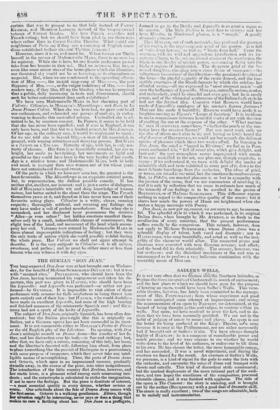• -
AT is not very often that we enture intollie Northern latitudes, or tekplore the terra incognita of Clerkenwell in search of amusement; and the last place to which we should have gone for the purpose of hearing an opera, would have been Sadler's Wells. This vene- rable theatre, however, has lately been committed to the manage- ment of Mrs. FITZWILLIA51; from whose experience and. good taste we anticipated some attempt at improvement; and seeing the announcement of an opera by BARNETT, we determined, at the hazard of being thought gothic and vulgar, to venture within its walls. Nay more, we have resolved to avow the fact, and. to de- clare that we have been unusually gratified. We are not in the habit of judging of music by names and places. An opera is not the better for being produced at the King's Theatre, oda song because it is sung at the Philharmonic, nor are either necessarily had if brought out at Sadler's \t'ells. We have always thought highly of BARNETT : he is a composer of considerable power and much promise ; and we were curious to see whether he would write down to the level of his audience, or endeavour to lift them e to his own. He has chosen the latter, the more honourable course, and has succeeded. ell was a -novel -experiniefit, and dieing the overture we feared Tor the result. An overture at Sadler's Wells,. we presume, is a kind of signal thr the gods to enter the lists with the orchestra, and encounter the noise of drum and trumpet with shouts and catcalls. This kind of discordant strife commenced; but the marked displeasure of the more rational part of' the audi- ence, and (we hope) the excellence of the composition, procured tolerable silence, and it was finished with applause. The title of the opera is The convent: the story is amusing, and is brought out by the author (RocksroNE) with a good deal of dramatic skill. The music is really excellent ; two of the songs are admirable, both as to melody and instrumentation.


























 Previous page
Previous page